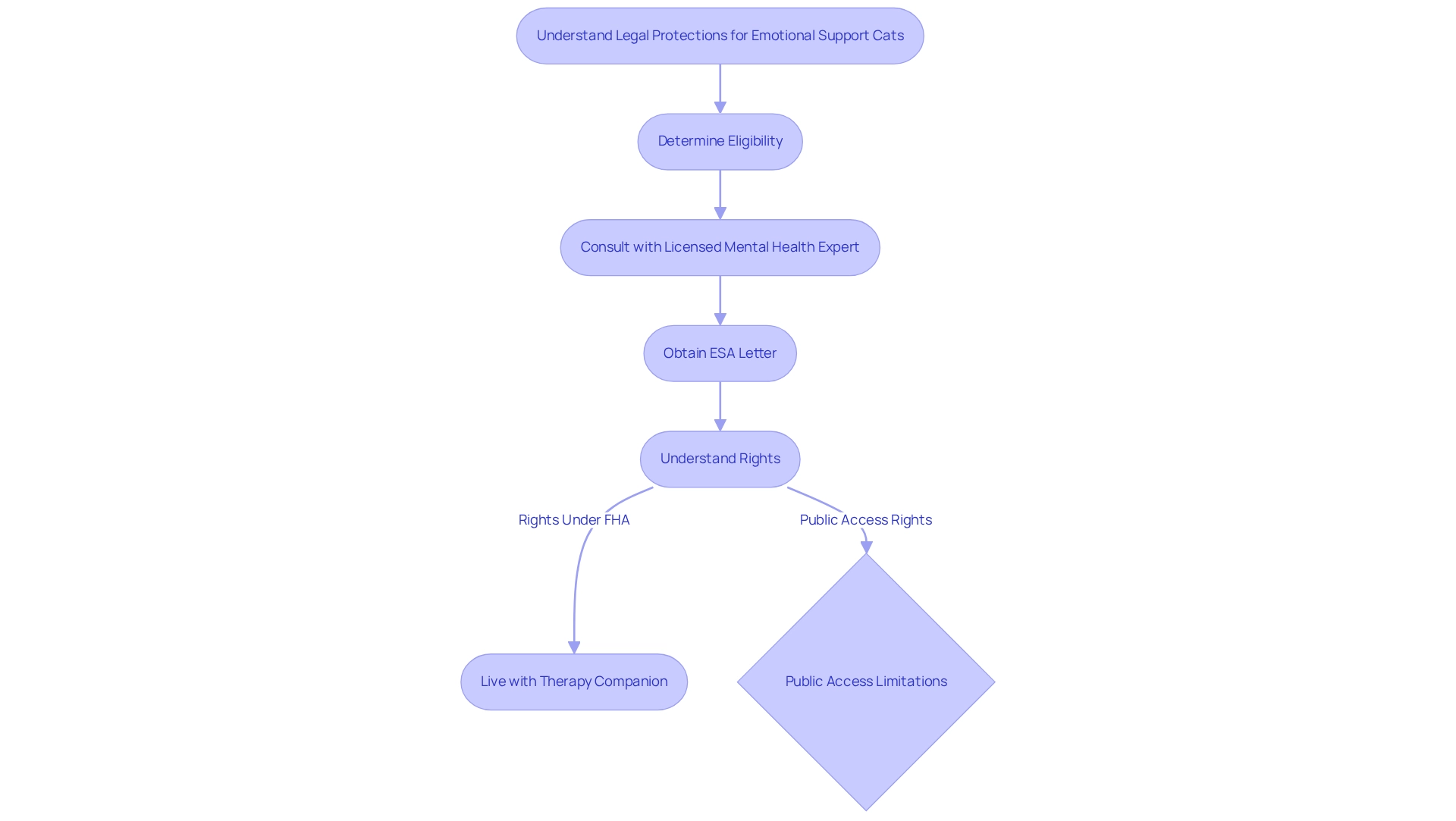

Can Cats Be Emotional Support Animals? Understanding Their Role
by Lena Park
Last updated: July 10, 2025
Verified and Approved by:
Angela Morris,
MSW, LCSW
Fact Checked

Overview
Cats can indeed serve as emotional support animals (ESAs), providing companionship and comfort to individuals facing psychological challenges. They play a significant role in mental health support. It’s important to recognize that while cats, particularly certain breeds like Ragdolls and Maine Coons, possess traits that enhance their effectiveness as ESAs, they do not have the same legal rights as service animals. This distinction is crucial for owners to understand in order to fully access the benefits associated with having an ESA.
Imagine the comfort of having a furry companion by your side during difficult times. The emotional support that cats can offer is profound, helping to ease feelings of loneliness and anxiety. For many, the presence of a cat can transform a challenging day into a more manageable one. However, it’s essential to be aware of the limitations regarding their legal status compared to service animals.
Understanding these nuances can empower you to navigate the complexities of emotional support. If you find yourself in need of such support, consider obtaining an ESA letter, which can help you access the comforting companionship of a cat while ensuring you are informed about your rights and responsibilities. Remember, you are not alone on this journey, and there are resources available to support your emotional well-being.
Introduction
In a world where emotional well-being is increasingly recognized as vital to overall health, many individuals face profound emotional or psychological challenges. These struggles can often feel overwhelming, leaving one in search of comfort and support. In this context, the role of Emotional Support Animals (ESAs) emerges as a compassionate solution. These gentle companions provide solace and understanding, helping to enhance the quality of life for those who need it most.
Unlike service animals trained for specific tasks, ESAs primarily serve as a source of emotional support, offering comfort during times of distress. This article explores the unique characteristics of emotional support cats, the legal protections they enjoy, and the steps required to obtain an ESA letter, shedding light on the profound impact these animals can have on mental health.
Understanding their rights and roles in society is essential, as it reflects the support available to those navigating their emotional journeys.
Define Emotional Support Animals: Purpose and Role
Assistance Animals (ESAs) are beloved pets that provide comfort and support to individuals navigating psychological challenges. Unlike assistance animals, which are trained to perform specific tasks for those with disabilities, ESAs primarily offer companionship and emotional stability. Their presence can significantly alleviate symptoms of anxiety, depression, and PTSD, making them invaluable to those who rely on their support.
The bond between an ESA and its owner is often profound, as these animals can sense their owner’s emotional state and respond with warmth and comfort. While many dog breeds are commonly chosen for service roles due to their specific traits, it’s essential to recognize that the question of whether can cats be emotional support animals is valid, as they can be included among a variety of ESAs.
At Wellness Wag, we prioritize your privacy and adhere to the Health Insurance Portability and Accountability Act (HIPAA), ensuring your personal health information is handled with care. Understanding the distinctions between ESAs and service dogs is vital, as ESAs do not possess the same legal rights and access to public spaces as service dogs under the ADA. By acknowledging these differences, we can better appreciate the unique role that ESAs play in enhancing the well-being of their owners.
Identify Characteristics of Emotional Support Cats
Emotional assistance cats embody essential characteristics that significantly enhance their role as comforting companions. Their calm demeanor, sociability, and capacity to forge strong bonds with their owners are vital traits. Cats that are affectionate and enjoy close contact with their humans can provide immense comfort and security. Importantly, the soothing sound of a cat’s purr has been shown to alleviate stress and anxiety levels, contributing to a more serene environment for their owners.
Certain breeds shine particularly bright in this nurturing role. Ragdolls, known for their gentle and affectionate nature, often seek out human interaction, making them ideal companions. Maine Coons, with their friendly disposition and playful behavior, also excel in providing companionship. Similarly, Siamese cats, recognized for their friendly and vocal traits, can cultivate a strong bond with their owners.
Statistics reveal that pet ownership, especially during challenging times like the COVID-19 pandemic, has been linked to enhanced mental health outcomes, particularly among partnered individuals. This underscores the profound importance of companionship. As Jonalyn Dionio insightfully observes, “Understanding and overcoming obstacles associated with housing regulations and travel restrictions remains essential for ensuring individuals obtain the assistance they require.”
As more people recognize the therapeutic benefits of emotional assistance animals, it becomes increasingly vital to understand can cats be emotional support animals and the traits that make specific cat breeds effective in this role. Moreover, it is essential to acknowledge the documented risks ESAs face in air travel, highlighting the need for improved protections and awareness of the challenges these beloved creatures encounter.
Understand Legal Protections for Emotional Support Cats
The question of whether cats can be emotional support animals is important, as they provide vital support for individuals navigating mental health challenges and are granted specific legal protections primarily under the Fair Housing Act (FHA). This important legislation allows those with mental health conditions to live with their therapy companions in housing that may otherwise limit pets. However, it’s essential to understand that therapy animals do not possess the same public access privileges as service animals. Consequently, while they can accompany their owners in their homes, they may not have the same rights in public spaces or on public transportation without prior arrangements.
For owners to benefit from these legal protections, obtaining a valid ESA letter from a licensed mental health expert is crucial. This letter validates the necessity of the animal’s assistance. At Wellness Wag, we are dedicated to streamlining this process. After submitting the required forms, clients are connected with licensed medical doctors for personalized consultations. Following a thorough evaluation, clients receive a professionally crafted ESA letter, recognized legally, within 24 hours of their consultation.
Statistics reveal that many individuals benefit from the FHA’s regulations for assistance animals, with over 50,000 patients having received ESA letters through specialized platforms like Wellness Wag. This underscores the growing acknowledgment of the psychological advantages that pet companionship can offer for mental well-being.
As Lisa, a client, shared, “The Wellness Wag team guided me through every step of the process, from understanding HUD guidelines to preparing the necessary documentation.” This highlights the compassionate support available to individuals navigating the ESA letter process.
In conclusion, while therapy cats play a crucial role in enhancing mental health, it raises the question of whether cats can be emotional support animals, and their rights differ significantly from those of assistance animals. It is vital for owners to be aware of and comply with legal requirements to ensure both their protection and the rights of their beloved companions.

Outline the Process for Obtaining an ESA Letter
Obtaining an ESA letter begins with a heartfelt consultation with a licensed mental health professional (LMHP) who can truly understand your mental health needs. This initial discussion often involves a deep exploration of your psychological challenges and how an emotional assistance companion (EAC) could provide vital support in your journey, especially considering how can cats be emotional support animals. At Wellness Wag, we are here to make this process as seamless as possible. We connect you with a licensed medical professional for a personalized consultation and thorough evaluation to determine your eligibility for an ESA. If the LMHP finds that an ESA is appropriate for you, they will issue a letter that includes your name, the professional’s qualifications, and a statement affirming the necessity of your pet. This important letter must be shared with landlords or housing authorities to secure your rights associated with having an ESA.
It is essential to note that only licensed mental health professionals can provide valid ESA letters; veterinarians are not authorized to do so. This process is thoughtfully designed to ensure that only those who genuinely need emotional assistance animals, including answers to the question of can cats be emotional support animals, can receive the necessary documentation. Therapists must uphold ethical standards and resist any client pressure, as this is crucial for maintaining the integrity of the mental health profession. By following ethical guidelines and remaining informed about ESA laws, LMHPs can offer the support you need while building trust and managing expectations.
Typically, you can expect to receive your ESA letter within 24 hours after approval, making this process both efficient and timely. This streamlined approach not only enhances your access to housing and travel accommodations but also underscores the importance of having an up-to-date ESA letter, which should be renewed annually to remain valid. Discover the effortless way to obtain your legitimate ESA letter with Wellness Wag by taking our quick assessment today. Remember, you are not alone in this journey, and we are here to support you every step of the way.
Conclusion
Emotional Support Animals (ESAs) play a vital role in enhancing the emotional well-being of individuals grappling with psychological challenges. These animals, particularly emotional support cats, offer companionship and comfort that can help alleviate symptoms of anxiety, depression, and PTSD. Recognizing the unique traits that make certain cat breeds effective emotional companions is essential, as their calming presence can profoundly improve the quality of life for their owners.
For those facing mental health conditions, legal protections under the Fair Housing Act (FHA) ensure the right to live with their ESAs. However, it’s important to understand that ESAs do not possess the same public access rights as service animals. Obtaining an ESA letter is a crucial step in securing these rights, which involves a consultation with a licensed mental health professional who can affirm the need for emotional support. Platforms like Wellness Wag simplify this process, making it more accessible for those who genuinely require the comfort of their animals.
In conclusion, the significance of emotional support animals, especially cats, cannot be overstated. They provide invaluable emotional stability and companionship, contributing positively to mental health. By understanding their roles, the legal protections available, and the process of obtaining an ESA letter, individuals can navigate their emotional journeys more effectively, ensuring they have the support they need to thrive. As society increasingly acknowledges the benefits of ESAs, fostering awareness and understanding of their importance in mental health care becomes crucial.
Frequently Asked Questions
What are Emotional Support Animals (ESAs)?
Emotional Support Animals (ESAs) are beloved pets that provide comfort and support to individuals facing psychological challenges, primarily offering companionship and emotional stability.
How do ESAs differ from assistance animals?
Unlike assistance animals, which are trained to perform specific tasks for individuals with disabilities, ESAs primarily offer companionship and help alleviate symptoms of anxiety, depression, and PTSD.
Can cats be considered Emotional Support Animals?
Yes, cats can be included among a variety of ESAs, along with many dog breeds that are commonly chosen for service roles.
What is the bond between an ESA and its owner like?
The bond between an ESA and its owner is often profound, as these animals can sense their owner’s emotional state and respond with warmth and comfort.
What legal rights do ESAs have compared to service dogs?
ESAs do not possess the same legal rights and access to public spaces as service dogs under the Americans with Disabilities Act (ADA).
How does Wellness Wag handle personal health information?
Wellness Wag prioritizes privacy and adheres to the Health Insurance Portability and Accountability Act (HIPAA), ensuring that personal health information is handled with care.
Certify Your Emotional Support Animal Today

Why You Can Rely on Us?
At Wellness Wag, we believe your pet deserves care rooted in both science and compassion. Each article is carefully researched, written in clear language for pet owners, and then reviewed by qualified professionals to ensure the information is evidence-based, current, and practical for real-life care. Our goal is to help you feel confident in making informed decisions about your pet’s health and well-being.
Reviewed by
Angela Morris, MSW, LCSW
Angela is a licensed clinical social worker with 20 years of experience in patient advocacy and community mental health. She has assisted numerous clients with ESA evaluations and brings a deep understanding of disability accommodations, ensuring that all information is accurate, supportive, and practical.

Written by :
Lena Park
Last Updated :
July 10, 2025












